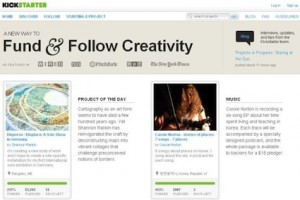There is a common myth that documentaries are, by nature, “low-budget” films. While certain costs may be lower, such as compensating actors, or covering large amounts of crew to feed/transport, there are considerations that must be made, such as…
– Film festival submission fees
– Transportation fees (since a lot of docs are shot on-location)
– Marketing and promotional materials
– Covering crew expenses (editors have to often deal with 100+ hours of footage… that’s a lot of work!)
– Materials expenses (DVDs, packaging, etc.)
– And so on…
Don’t be worried, though. There are a lot of tools that can help you achieve you goals. Here’s a super-condensed run-down of ways to free you of your financial frets…
1. Online Fundraising Tools, like Kickstarter or IndieGoGo
Advantage: if you already have a good following of the film or its topic online, this is a great way to engage folks and spread the word virally. People can pay online, which is super convenient for them.
Disadvantage: In order to be profitable, these sites do take a small percentage of your money. Also, Kickstarter won’t let you keep your funds if you don’t meet your goals in the time you allotted.
2. Grants (examples include ITVS and CAAP)
Advantage: this is how most professional documentary filmmakers try to get funding, so filling out killer grant applications is a very useful tool to learn, and could potentially help you when applying for jobs in the field
Disadvantage: grants are often super-competitive and may sometimes require 501(c)3 charitable status…the best way to work with these issues are to partner with a non-profit organization or cause that has a reputable background
3. Old-Fashioned Event Fundraising
Advantage: if your project has the potential to attract a lot of local people to a single location, then it might be worth renting out a venue and maybe showing a rough cut, providing informational materials, entertainment, and/or raffle prizes to help raise money. It’s a great way to truly engage your audience.
Disadvantage: you have to really be choosey about where you’re going to host the event. Many places charge a fee, and, for example, if the event is at a bar, there are various policies regarding the proceeds of drinks purchased, etc. These events also take a lot of planning and marketing, so if your project can’t spare a little energy for event fundraising, it might be best to go a different route.
4. Educational/Community Screenings
Advantage: if you’ve already completed a project, consider contacting local organizations and schools to screen your film…this can be mutually beneficial, as you can charge them a flat fee, and they can charge an entry fee so they can make a little money also
Disadvantage: the place screening your film may have their own agenda. Make sure you have a clear mode of communication with the person running the event there, so that you know what everybody’s responsibilities are, and that you’ll get your fair share of recognition.
